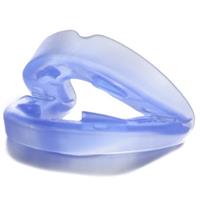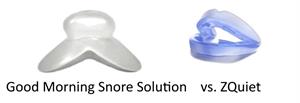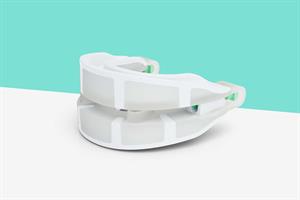Exploring Snoring Solutions: Unveiling Effective Alternatives
Snoring can be an exasperating issue to tackle, especially when you're on the hunt for the perfect remedy that aligns with your lifestyle and needs.
ZQuiet is dedicated to offering accurate and up-to-date information about the array of options available for snoring relief. Make sure to check out our detailed ZQuiet product review.
In this exploration, let's delve into two prominent solutions: snoring mouthpieces and continuous positive airway pressure (CPAP) devices.
Understanding Snoring Mouthpieces and CPAP Devices

Snoring Mouthpieces: A Clear Path to Quiet Nights
Snoring mouthpieces, also known as "snoring mouth guards" or "oral appliances," are among the most common choices for addressing snoring. These come in two main types: mandibular advancement devices (MAD) and tongue stabilizing devices (TSD). Both variants target a core issue contributing to snoring: the relaxation of throat muscles that leads to air vibration against soft tissues, generating the distinctive sound of snoring.
MAD mouthpieces, exemplified by ZQuiet, alleviate this by subtly repositioning the lower jaw forward, widening the airway and diminishing the snoring sound. On the other hand, TSD mouthpieces prevent the tongue from sliding backward during sleep, a significant factor in snoring noise.
Features and Benefits of Snoring Mouthpieces
Different snoring mouthpieces offer a variety of features, catering to individual preferences. Some models require preparatory steps like molding to fit your mouth, which can be uncomfortable and time-consuming. ZQuiet, however, introduces a unique approach with its Living Hinge technology and 2-Size Comfort System, allowing for an effortless and comfortable fit without the hassle of preparation.
While some mouthpieces restrict mouth breathing by keeping the jaws clenched, ZQuiet's design permits natural jaw movement and effortless mouth breathing.
Potential Challenges with Snoring Mouthguards
While snoring mouthpieces are effective for many, they might not be suitable for everyone.
Individuals with specific dental issues such as dentures, oral prosthetics, missing teeth, or pronounced overbites might face challenges with mouthpieces. Consulting a dentist is advisable to determine if a snoring mouthpiece is compatible with your dental condition. It's essential to explore different mouthpiece types and their features before making a decision.
Introducing CPAP Devices: A Different Approach Understanding CPAP Devices
Continuous positive airway pressure (CPAP) devices are a distinct approach to combating snoring, sleep apnea, and other breathing disorders.
Unlike snoring mouthpieces, CPAP devices function by delivering a continuous stream of air pressure through a mask or nasal cannula, keeping the throat open and reducing soft-tissue vibration and snoring sounds.
Pros and Cons of CPAP Devices
While CPAP devices are known to be effective, they present unique challenges. The noise generated by the CPAP machine and the discomfort of wearing a mask can disrupt sleep. Issues like mask fitting, adjusting to air pressure, noise disturbance, claustrophobia, and falling asleep can pose obstacles.
Additionally, the cost of CPAP devices might deter budget-conscious individuals. Some CPAP users keep a snoring mouthpiece as a convenient alternative for specific situations.
Choosing Between an Oral Appliance and CPAP Device Making the Decision
Ultimately, the choice between a snoring mouthpiece and a CPAP device hinges on your preferences, medical advice, and specific needs. CPAP devices excel in treating severe sleep apnea, while snoring mouthpieces provide a comfortable, cost-effective, and quick solution for general snoring. Regardless of your choice, prioritizing a restful sleep experience is crucial.
Embrace Quality Sleep with ZQuiet
If you're seeking a snoring solution that combines comfort and effectiveness, consider ZQuiet. Its innovative features and design aim to deliver an improved night's sleep without the need for extensive preparation. Explore how ZQuiet can redefine your sleep quality and make restful nights a reality.
FAQ: ZQuiet, CPAP Devices And General Snoring
Can ZQuiet Replace CPAP?
ZQuiet is primarily designed to address snoring, not to replace CPAP devices.
While ZQuiet offers a comfortable and effective solution for general snoring, it's important to note that CPAP devices are often recommended for more severe cases of sleep apnea.
CPAP devices provide continuous positive airway pressure that helps keep the airway open during sleep, making them a preferred option for managing sleep apnea. If you have sleep apnea, consult with a healthcare professional to determine the most suitable treatment approach for your specific condition.
Can You Use ZQuiet with Sleep Apnea?
ZQuiet is indicated for snoring relief and may not be recommended as a standalone treatment for sleep apnea.
Sleep apnea is a medical condition that requires careful management to ensure proper breathing during sleep.
If you have sleep apnea, it's crucial to consult a healthcare professional who can recommend appropriate treatment options, which may include CPAP devices, lifestyle changes, or other therapies tailored to your needs.
Does ZQuiet Actually Work?
ZQuiet has been designed and marketed as an effective solution for reducing or eliminating snoring noises.
The design of the ZQuiet mouthpiece aims to address the relaxation of throat muscles that contribute to snoring by gently adjusting the lower jaw or tongue position.
Many users report positive experiences and reduced snoring sounds after using ZQuiet.
However, individual results may vary, and it's recommended to read reviews, consult with healthcare professionals, and consider personal comfort when evaluating its effectiveness for your specific situation.
What Are the Cons of ZQuiet?
While ZQuiet offers benefits for snoring relief, there are a few potential drawbacks to consider:
-
Not Suitable for Everyone: ZQuiet may not be suitable for individuals with specific dental issues, such as certain types of dental prosthetics or severe dental conditions.
-
Limited Applicability to Sleep Apnea: ZQuiet is not a replacement for CPAP devices in cases of sleep apnea. Severe sleep apnea requires more comprehensive treatment approaches.
-
Comfort and Adaptation: Like any oral appliance, there might be an adjustment period to get used to wearing ZQuiet while sleeping.
-
Individual Variation: The effectiveness of ZQuiet can vary from person to person, and while many find it helpful, others may not experience the same level of relief.
-
Maintenance: Regular cleaning and maintenance of the mouthpiece are necessary to ensure hygiene and longevity.
Before using ZQuiet or any other snoring remedy, it's advisable to consult a healthcare professional to ensure that it's suitable for your individual needs and to rule out any underlying medical conditions that might contribute to snoring or sleep disturbances.



